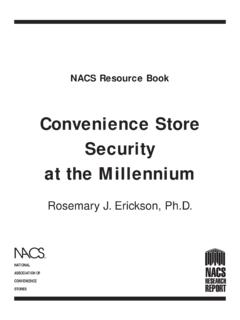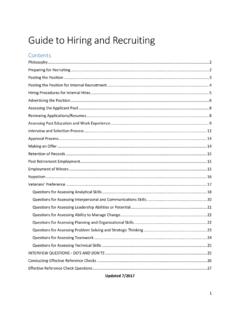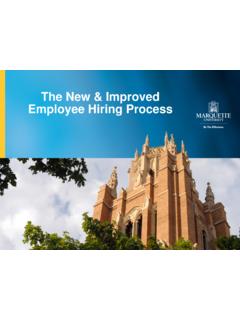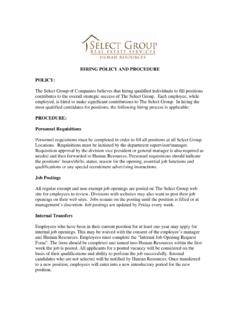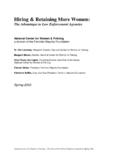Transcription of Using Arrest, Conviction, and Misdemeanor …
1 1 SummaryIt is a common belief that the Equal Employment Opportunity Commission (EEOC) prohibits the use of arrestand Misdemeanor information in the hiring process. As is discussed below, this is not the case. What the EEOC does prohibit is the use of arrest and Misdemeanor information to exclude an applicant from employmentwithout considering the four factors below. Furthermore, what many employers do not realize is that the EEOC also requires that they consider the last three of the following four factors in determining whether even anapplicant sfelonyconvictionis grounds for denying the applicant actually commit the offense? is the nature and gravity of the offense? long ago was the offense? is the nature of the job being applied for?The EEOC also states that employers should not ask applicants about arrests which have not lead to convictions,since such questions may have a chilling effect upon minorities and discourage them from applying for a does not prohibit employers from learning about these arrests from court records supplied by GIN.
2 Using arrest , conviction , and MisdemeanorInformation in the hiring information reflects GIN understanding of these issues at the time of this writing. Itis not legal advice and is not intended to replace competent legal may wish to seek an opinion from legal counsel on these arrest , conviction , and MisdemeanorInformation in the hiring ProcessPros and Cons of Screening Out arrest and Misdemeanor Information from Criminal RecordsA few of our customers have requested that GIN screen out all arrest and Misdemeanor information from thecriminal records they receive. We believe that screening out such information has both advantages and dangersfor our of screening out arrest and Misdemeanor information: Many times the information whichwe provide is used by local managers who do not have extensive human resources training. By precludingthese managers from seeing arrest and Misdemeanor records, corporations ensure that those managers willnot use the information corporation is then safeguarded from the risk of a discriminationsuits which could result from the inappropriate use of those of screening out arrest and Misdemeanor information:Following are two hypotheticalexamples demonstrating scenarios which could occur if a hotel screens out arrest and misdemeanorinformation: The hotel interviewed Amy and did a criminal background check.
3 Although Amy had a history ofshoplifting and other small dollar thefts, this information was screened out of the reports to the hotelbecause all of the convictions were misdemeanors. Later the hotel was forced to terminate Amy when shewas caught stealing from guests rooms. The hotel lost several regular customers because of the incident. John applied for a job as a maintenance person in the hotel. He had been arrested twice for childmolestation but was not convicted either time because the parents of the alleged victims refused to allowtheir children to testify, saying that they had suffered enough. Because the hotel had directed that arrestinformation be screened from the criminal records they ordered, they hired John without being aware ofthe past allegations against him. John later was convicted of Using his hotel key to enter a guest s roomand molest a 12 year old girl who had been left there by her parents. The judge in the case ruled thatthere was no law prohibiting the hotel from Using arrest information in the hiring process and that thehotel did have a duty to protect the safety of its guests by making a reasonable inquiry into thebackground of those who could enter guests rooms.
4 The jury awarded a multi-million dollar judgmentagainst the light of the fact that the EEOC does not prohibit the use of arrestand Misdemeanor information in the hiring process, employers mustweigh the possible discrimination suits which could be broughtagainst them for misusing the information against the possibleconsequences of refusing to consider the arrest , conviction , and MisdemeanorInformation in the hiring ProcessUsing arrest Information in the hiring ProcessThe EEOC states that it ispermissible to use arrest information in the hiring process..an arrest record may be usedas evidence of conduct upon which an employer makes an employmentdecision. An employer may deny employment opportunities to persons based on any prior conduct whichindicates that they would be unfit for the position in question, whether that conduct is evidenced by an Arrest, conviction or other information provided to the employer. It is the conduct, not the arrest or conviction per se,which the employer may consider in relation to the position sought.
5 (EEOC Policy Statement, , , September 7, 1990, underlining added)What is forbidden by the EEOC is a blanket policy barring employment to those who have been arrested fora crime. An arrest record does no more than raise a suspicion that an applicant may have engaged in aparticular type of conduct. (Ibid., )When confronted with information about the applicant s previous arrest re c o rd, the EEOC directs employers to:1..determine whether the applicant is likely to have committed the conduct alleged. (Ibid.) ..the nature and gravity of the offense. (Ibid., ) ..the time that has passed since (Ibid.), ..the nature of the job held or sought. (Ibid.)Background of the EEOC s PositionThe EEOC states that if a hiring standard disqualifies a disproportionate number of minority applicants fromemployment, then an employer must prove that there is a business necessity for Using that standard. Becauseminorities are both arrested and convicted more often than the general public, businesses are in danger of beingcharged with discrimination if they do not follow the EEOC guidelines for the use of this arrest Information in the hiring Process (continued)The material below provides a more detailed explanation of these four whether the applicant is likely to have committed the alleged first requirement is the most difficult.
6 The EEOC states that an employer ..must determine whetherthe applicant is likely to have committed the conduct alleged..An employer need not conduct aninformal trial or an extensive investigation to determine an applicant s or employee s guilt or , the employer may not perfunctorily allow the person an opportunity to explain and ignore theexplanation where the person s claims could easily be verified by a phone call, , to a previous employeror a police department. The employer is required to allow the person a meaningful opportunity to explainthe circumstances of the arrest (s) and to make a reasonable effort to determine whether the explanation iscredible before eliminating him/her from employment opportunities. Pages 6-8 of the attached EEOC Policy Statement provide excellent examples of what the EEOC believesto be reasonable in this area. Obviously it will be very helpful to have this step handled by someone withexperience in human the nature and gravity of the offense or to pay cab fare is a Misdemeanor in some states.
7 So is parking where temporary No Parking signshave been posted. But are they grave enough offenses to warrant rejecting someone for a job? The EEOC asks employers to consider the nature and gravity of an offense rather than adopting a policy which rejectsall applicants who have even an insignificant criminal the time that has passed since the EEOC Policy Statement does not provide guidance on when an alleged action is too old to beconsidered relevant. Most employers would feel that a charge of murder or rape would stay relevant muchlonger than a charge for the possession of a small amount of marijuana. It should be mentioned that theFair Credit Reporting Act prohibits consumer reporting agencies like GIN from reporting on criminalhistories which are over seven years old unless the applicant makes over $75,000 a year. (Unless specificallyrequested to do otherwise, we limit all of our inquires to the last seven years.)
8 The nature of the job held or arrest or conviction for a DUI may not be relevant information for a job as a mail clerk where there areno driving responsibilities. A conviction for unemployment benefit fraud may not be relevant informationfor a job as a bus driver. On the other hand, even Misdemeanor theft charges would be relevant for a jobas a hotel maid where the applicant would have easy access to guests arrest , conviction , and MisdemeanorInformation in the hiring Process5 Asking About arrest Information in the hiring ProcessThe EEOC has stated that asking applicants about arrests which have not lead to convictions may have a chilling effect upon minorities and discourage them from applying for a job. In addition, some states prohibitemployers from asking about arrest information. (See following information about state laws.) For these reasonsmany employers ask applicants to disclose convictions but not arrests on their job application.
9 They rely on theactual criminal history records they obtain from GIN to inform them about arrests which have not led to conviction Information in the hiring ProcessThe EEOC states that employers generally may not have a policy excluding all applicants who have beenconvicted of a crime, even if the crime was a felony. If there is a conviction , the employer may presume thatthe applicant did commit the alleged conduct and is not required to make further investigation. This is the onlyway in which the treatment of a conviction in the hiring process is different from the treatment of an employer must ..the nature and gravity of the offense. (Ibid., ) ..the time that has passed since the conviction . (Ibid.), ..the nature of the job held or sought. (Ibid.)To comply with the EEOC policy statement, employers should establish guidelines which reflect reasonablebackground standards for the job. For instances, a hotel hiring for positions which allow access to guests roomsmight exclude applicants with a felony conviction in the last seven years.
10 Some employers also allow an appealto the home office human resources department for exceptional Misdemeanor Information in the hiring ProcessThe EEOC does not prohibit the use of Misdemeanor information in the hiring process. As described above,the EEOC does require that employers consider the nature and gravity of an arrest or conviction . Employersshould not, therefore, automatically exclude all employees who have a Misdemeanor on their record. On theother hand, some Misdemeanor charges can be highly relevant to hiring decisions. Possession of marijuana,shoplifting, and domestic violence are all considered to be misdemeanors in some states. That does not meanthat employers cannot consider this information in the hiring the Local Manager Comply with EEOC GuidelinesSome corporations take these steps to assist their local managers to apply the EEOC ovide reasonable and clear guidelines on what is an unsatisfactory criminal history for a given hiring decisions involving arrest information to a senior human resources person who has theexperience and knowledge to do the type of investigation required by the arrest , conviction , and MisdemeanorInformation in the hiring Process6 Sample Policy for the Use of arrest , conviction , and Misdemeanor InformationThe following is an example of a policy which attempts to comply with the EEOC guidelines on the with State LawsState laws dealing with the use of criminal history information in the hiring process are more complicated thanthe EEOC guidelines.
